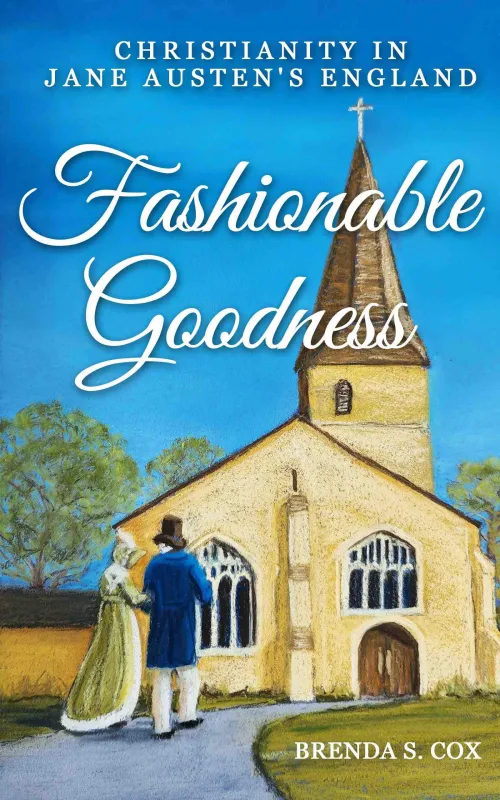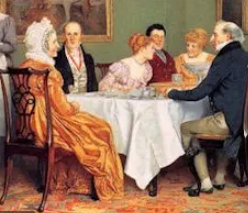Till this moment, I never knew myself.”–Elizabeth Bennet in Pride and Prejudice, quoted in 30-Day Journey with Jane Austen.
In these days of stress and anxiety, do you long for a few minutes of peaceful reflection each day? Take a 30-Day Journey With Jane Austen. Jane is an excellent travel companion!

30-day Journey with Jane Austen by Natasha Duquette
Natasha Duquette has chosen thirty profound passages from Jane Austen. Most are from Austen’s novels; the last three are from her prayers.
Each daily passage is followed by an explanation, putting the passage in context and sometimes including connections to Austen’s life. Then a Reflection section connects the passage to our lives, giving us thoughts to chew on for that day.
The brief chapters in this book encouraged and inspired me each morning.
Highlights
Here are a few highlights that I appreciated:
Some reflections focus on our own hearts. On Day Two, Elinor Dashwood considers how “extravagance and vanity” have made Willoughby “cold-hearted and selfish” (Sense and Sensibility). Duquette points out that the Austen family themselves had to live economically, unlike some of Austen’s characters.
Natasha Duquette tells us that Elinor “realizes unthinking habits of luxury have led Willoughby to waste the valuable gifts placed in his hands. . . . Wasteful choices can interfere with true joy in our lives.”
The section concludes, “Focus on practices that build positive attachments to God, to human beings, and to other gifts in your life, rather than to material possessions. Think about how you might steward your resources wisely, hold them lightly, and express gratitude for them joyfully.”
A good reminder to live each day with thankfulness for what we have. We can experience joy today, whatever our circumstances, rather than wait for joy from what we might get in the future.
The Dashwoods teach us about peace as well as joy. On Day Three, volatile Marianne Dashwood “resolves to form habits that can lead to health and peace.” She intends to enjoy nature, reading, music, and her sister’s companionship. Could you find health and peace today in any of those ways?
Practical Suggestions
Some lessons are concrete. On Day Seven, Elizabeth Bennet reflects on Darcy’s letter as she walks for two hours. Duquette points out, “The classical philosopher Aristotle believed reason was sharpened by walking. Austen agreed.”

After Elizabeth receives Darcy’s letter, she walks alone for two hours to consider what the truth is. C. E. Brock illustration of Pride and Prejudice, public domain.
The Reflection section adds, “Such walking grounds us in reality. Often an answer to a problem will crystallize not as we are sitting statically before a computer screen but as we are physically moving somehow.” Duquette encourages us to “Reconsider a problem or challenging situation in your life as you exercise.”
Even in days of isolation, we need ways to exercise our bodies and give ourselves time to think. I walk up and down the hall of my small apartment for thirty minutes each day, thinking and praying. Others of you may have the opportunity to walk outside, as Elizabeth Bennet did, enjoying the outdoors as you consider whatever comes to mind.
Encouragement for Relationships
Day 10 is about our relationships. In Mansfield Park, Edmund finds his little cousin Fanny crying. He asks persistent questions and listens well, to console her. He then takes her outside, where she can be comforted by the beauties of nature. Duquette explains, “Edmund’s care for Fanny is pastoral, foreshadowing his eventual call into life as an Anglican priest.”
Jane Austen was sent away from home to study with Mrs. Cawley when she was only seven. So she knew how Fanny felt.
Duquette encourages us to notice people who are sad, and “then make time and space to listen to their story in a peaceful environment. You may be surprised at the effectiveness of such gentle attention.” Such deep connections, whether virtual or in person, can encourage you both.

Edmund’s small kindnesses to Fanny Price made a big difference to Fanny. C. E. Brock illustration of Mansfield Park, public domain.
Spiritual Reflections
On Day 15, we think a bit about our mortality. Tom Bertram of Mansfield Park faced death, and because of that he became a better person. Duquette says, “Anglicans in Austen’s day would pray for a good death as part of their liturgy on a Sunday morning.” She encourages us to think about death, not fearfully, but to put our lives in perspective. We might consider, as Tom did, whether we are living for others as well as for ourselves.
The last three days, based on Austen’s prayers, focus more on our relationship with God. Day 30 encourages us to examine our own hearts, and look for ways to “reflect the infinite love of God to a hurting world deeply in need of mercy and grace.”
The 30-Day Journey Series: “Our Greatest Spiritual Thinkers”
30 Day Journey with Jane Austen is the newest addition to the 30-Day Journey series by Fortress Press. The publisher says:
“Enrich each day with wisdom from our greatest spiritual thinkers. Through brief daily readings and reflections, the 30-Day Journey series invites readers to be inspired and transformed. By devoting a moment to meaningful reflection and spiritual growth, readers will find deeper understanding of themselves and the world, one day at a time.”
I’m delighted, though a little surprised, to see Jane Austen join our “greatest spiritual thinkers”! The others in the series are Julian of Norwich, Dorothy Day (Catholic social activist), Martin Luther King, Jr., Dietrich Bonhoeffer, St. Hildegard of Bingen, and Emily Dickinson. Quite a varied lineup of thinkers.
I recommend 30-Day Journey With Jane Austen as a peaceful, encouraging way to begin each day. It will help you to reflect more deeply on important truths and how they might affect your life.
Links about the book:
- 30-Day Journey with Jane Austen (twice): www.amazon.com/30-Day-Journey-Jane-Austen/dp/1506457126/; publisher: www.broadleafbooks.com/store/search?ss=30-day+journey
- Persuasions On-Line (in the bio): http://jasna.org/persuasions/on-line/vol30no2/duquette.html?
About the blog post author:
Brenda S. Cox writes on “Faith, Science, Joy, and Jane Austen” at brendascox.wordpress.com .
About Natasha Duquette: For those who would like to know more about the author of 30-Day Journey With Jane Austen:
Dr. Natasha Duquette, Academic Dean and Professor of Literature, Our Lady Seat of Wisdom College, B.A., University of Alberta, M.A., University of Toronto, Ph.D., Queen’s University
Dr. Natasha Duquette is author of 30-Day Journey with Jane Austen (Fortress Press, 2020) and is currently serving as editor-in-chief for The Palgrave Encyclopedia of Romantic-Era Women’s Writing (Palgrave MacMillan), which is a collaborative project involving writers based in universities around the globe. She is also author of Veiled Intent (Pickwick, 2016), co-editor of Jane Austen and the Arts: Elegance, Propriety, and Harmony (Lehigh University Press, 2013), and editor of Sublimer Aspects: Interfaces between Literature, Aesthetics, and Theology (Cambridge Scholars Publishing, 2007). For the Chawton House Library series, she produced the first annotated, scholarly edition of Helen Maria Williams’s Julia, a novel interspersed with poetical pieces (Routledge, 2009).
Her articles have appeared in the journals Persuasions, Persuasions On-Line, English Studies in Canada, Christianity and Literature, Notes and Queries, Mosaic, and Women’s Writing. She has contributed essays to multiple collections, including Through a Glass Darkly: Suffering, the Sacred, and the Sublime in Literature and Theory (Wilfred Laurier University Press, 2010) and Art and Artifact in Austen (University of Virginia Press, 2020). Her research has been supported by fellowships from SSHRC, Chawton House, and Gladstone’s Library.
Dr. Duquette enjoys teaching courses on eighteenth-century satire, aesthetics, Jane Austen, African literature, and Indigenous writers of North America. Before coming to Our Lady Seat of Wisdom College, she taught full-time at the Royal Military College of Canada, Biola University in Southern California, and Tyndale University in Toronto, where she also served as Associate Dean of undergraduate studies for four years.







